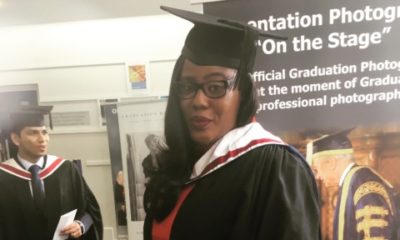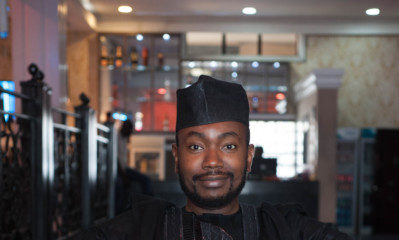Career
Move Back To Nigeria: “If Your Values Are Already Warped Then You’re in For a Tough Time” – Rotimi Thomas Shares his Thoughts on Moving Back
 Move Back to Nigeria is a new series on BellaNaija. The aim is to encourage young and not-so-young professionals in the diaspora who are trying to make the decision of whether to move back to Nigeria. In collaboration with the brilliant team at MoveBackToNigeria.com, we hope to bring you a weekly interview with individuals who have successfully made the leap. The idea is to share their successes and their challenges as they made the decision.
Move Back to Nigeria is a new series on BellaNaija. The aim is to encourage young and not-so-young professionals in the diaspora who are trying to make the decision of whether to move back to Nigeria. In collaboration with the brilliant team at MoveBackToNigeria.com, we hope to bring you a weekly interview with individuals who have successfully made the leap. The idea is to share their successes and their challenges as they made the decision.
A lot of Nigerians in the diaspora have questions about making a change at home in Nigeria. Many suggest really good ideas on how to make things better; others would like to contribute to making a difference back home but are just not sure where to begin.
The energy space is under focus this week as we feature a Canada-based young professional who has aspirations to contribute to the development of the power sector. Rotimi Thomas shares his experiences so far and his dreams for the power sector in Nigeria and Africa as a whole. Read on for an insight into his interesting life and his take on the process of moving back to Nigeria. We hope you enjoy this edition.
Thanks for speaking with us. To start off, who are you and what do you do?
My name is Rotimi Thomas and I’m a young professional who comes from humble beginnings. My goal in life is to help democratise electricity in Nigeria, in the sense that I would like to give ‘power’ to the people, as it were, so they can be more productive and can ultimately experience true economic development. I’m very focused on empowering people and that’s my dream in a nutshell.
That’s very ambitious but certainly doable. When did you originally leave Nigeria?
I’ve left Nigeria at various times for huge chunks of time. I was born in Port Harcourt but we moved to Holland when I was a year and half old for about 6/ 7 years. We then moved back to Nigeria afterwards where I spent the bulk of my childhood but around the age of 15 my parents moved us all to Canada. They were always very focused on us being international citizens and always wanted us in a sense, to act as a bridge between Nigeria and the rest of the world.
Tell us about your educational history.
I earned a Bachelor of Commerce in Finance with a minor in international business for my first degree at the University of Alberta, Canada. After which I worked for a few years and then went for an MBA and a Masters of Environmental Management (with a focus on energy and environment) at Duke University. I just finished this in May and I’m now preparing to move to Germany to work with an integrated technology company focusing on the power sector.
Finance, Commerce, Energy, the Environment… What inspired these choices?
It’s interesting especially considering the fact that I initially thought I was going to do Chemical Engineering following my dad’s footsteps, but I just was not a good chemistry student. So I started to look at the alternatives and went into finance due to its always relevant and forward looking nature. I also thought I would end up doing investment banking. However, I ended up in wealth management as an investment representative with one of the larger banks in Canada. I did that for about 4 years and then decided to go back to school. I was inspired to get into the energy space (more specifically, the power aspect of the energy business) because I believe power to be a significant missing link in Nigeria’s economic development. Show me one country that is considered a developed nation that achieved that status without the power or electricity to be productive? I studied the intersection of energy and environment combined with the MBA because I look forward to helping Nigeria democratise electricity but in a manner considerate to the environment. The environmental piece speaks to a responsibility that we undoubtedly have, to future generations.
So your career started in wealth management. What did your role entail?
I executed trading strategies for clients, provided market analysis, and also conducted private banking for clients. Eventually I got promoted to the high value accounts desk, which meant that I had to get pretty sophisticated with options, tools, equities and fixed income products as the high value clients were more demanding. So it was a mix of private banking and trading mixed into one job. Initially I enjoyed what I was doing as the learning curve was very steep. I had to write courses to get different licences so I could eventually trade options. Once I completed all my course requirements, the job became routine and I found myself seeking new challenges. I had also realised that every client I was dealing with was very money-focused. Not that there’s anything wrong with that but I felt there had to be more to life. So I started thinking about what my passions were, and how I could affect life in Africa and Nigeria in particular. I thought about what type of legacy I sought to leave behind in my time and how I could have impact in Nigeria. I considered the aspects of Nigeria I wished were improved and the power or electricity poverty situation overwhelmingly grasped my attention. I then decided that if I could get into the power sector and contribute to its growth, it would be a fulfilling short-term life goal. This is why I pursued a dual degree with the energy focus.
That, if achieved, will indeed be a fulfilling life goal. You have mentioned a few times your desire to contribute to development in Nigeria. What drives this desire?
My allegiance to Nigeria is because I am from that land and my intention to join the power reform initiative is a derivative of that. Retail, healthcare, agriculture, manufacturing, Oil and Gas, and Telecoms are just a few of the sectors that will benefit from stable power.
How exactly do you intend to effect this power reform you speak of in Nigeria?
A multi-pronged approach. First, my Masters project was focused and the comprehensive research involved was very enlightening and will ultimately prove useful. The next step will be working for an integrated technology company to understand the power business a bit better from an insiders’ perspective. In the next 2 or 3 years, I would love to go work with the company in the Nigeria office, helping with the build out of power plants, building efficient and optimised power plants to hopefully supply electricity and optimise the electricity grid. The company has a lot of technology that can be applied in that space so hopefully I can work with them there. I am really looking forward to creating ideas that will lead to power generation for people, particularly in the villages and in rural parts of Nigeria and the rest of Africa. As things are right now without reasonable access to electricity, Nigeria and a lot of other African countries are really selling themselves short. Whilst there are a lot of schemes that are being devised to alleviate poverty these schemes will fall short if people still lack the electricity to be productive. The awesome thing is there is a lot of room for innovative people to develop business models in this space so I’m very excited to see what models emerge to provide reliable access to electricity.
Does this imply a plan to move back to Nigeria soon?
In a way, yes. I plan to have one foot in and one out.
Interesting concept but how does that work in reality?
Nigeria is a special place. The Nigeria I know is not the sort of place one just dives right back into after living for so long elsewhere. From what I have observed, there are a few reasons why people moved back to Nigeria in recent times. Some people went back to seek the famed millions everyone is supposedly making there. Others exited the diaspora when the global economic crisis hit and a lot of people got put out of work. Nowadays, it’s kind of a mixed bag as people are hearing about the different opportunities that exist in Nigeria. Everyone wants to go and hustle and make something for themselves, especially people in search of a land that does not have a ‘glass ceiling’. However, one has to be careful. I would also love to move back to Nigeria for these reasons (who doesn’t love opportunity), and also because it is my homeland, but I’d prefer to do it in a measured and sustainable manner. As much as I love the country, it can be a very hectic place. Accordingly, I’d love to do business there weeks or months at a time and then leave to do international transactions, and then do it all over again. In essence, never permanently remaining in the country. However, whenever I do have kids, I would love them to know where they are from. This might all be wishful thinking but we shall see.
Don’t you feel you may be better placed to make more of an impact if you joined the government or ran for public office?
Not necessarily. I believe more in the private sector and that the job of the government is to enable the private sector. The government’s job is to provide strong, healthy honest institutions that monitor, regulate and stimulate private companies to hire people and do business, to produce income that moves the country forward, essentially providing GDP. So I feel the private sector would be where my skills are best served. I completely feel the private sector is the way to go. I also feel I do not have the civil service bone in me. You clearly support capitalist notions, so in that vein what role do you think the private sector can play in revamping the role of Nigeria internationally?
I think as Nigerians, we have a huge PR problem. All over the world, once Nigeria is mentioned people cringe and that negative reputation obviously affects our ability to gain people’s trust It affects our ability to be a desired investment destination – though this is changing with the opportunities that exist in the country. shoot ourselves in the foot with the contentious reputation we create in many places we frequent and also in our own nation. We are really intelligent people but need to move away from being defined by such negative connotations as con artistry, kidnapping etc. We need to start being known for the brilliance that we possess. This is slowly happening and those in the private sector are playing a large role in this. For instance, the tourism industry if taken over by the private sector and supported by the right government policies could serve Nigeria well and promote a more positive image for us around the world. Promoting tourism in Nigeria, however, is useless without enhanced security. A secure country where people are not getting kidnapped and the police force is effective would really help our case. Which brings us to options like a private police force and so on. There are a lot of things that the government should be doing but is not and this is where capitalism, like it or not, might be more beneficial. If people are incentivised, they will provide needed services at the lowest cost possible hoping to maximize their profits.
On a different note, what are your general thoughts regarding moving back to Nigeria?
A lot of us are moving back in search of money, which is a good thing as it helps us become responsible members of society. However, when you move back to Nigeria, due to the very unique nature of our society, your value system might be affected to a certain degree. For instance, if you’ve worked in the west, you are probably used to due diligence and doing things a certain way but out in Nigeria, things don’t exactly go the same way. You don’t just show up and expect everyone to respect who you are or value your education or expect people to follow rules. Though I have never worked in Nigeria, I have a feeling that rules are not always followed – more blatantly than is the case in the west So you have to think about what part of yourself you are willing to sacrifice. Will you be happy with the person you become when you have to work in that sort of environment? These are a few of the softer things to consider when thinking about moving back as opposed to just thinking about the tons of money potentially to be made. Consider how you will safeguard against an attack on your value system.
While that may be true, it can be argued that who you become is probably who you really are in the first place…
You need not accept who you feel you are destined to be – you have choice. Even if you move back to Nigeria and you are destined to fall prey to corruption or malpractice, you can safeguard yourself to an extent – I have no advice on this other than staying true to your values. If your values are already warped then you’re in for a tough time.
Finally and for our readers benefit, do you have any tips for people considering a move back to Nigeria?
Yes I do. My first tip would be that a preferred way to move back should be with a multinational organisation if possible. This allows you enter the system seamlessly and it helps soften the blow of the hardship you may be about to endure, basically a soft landing.
If you can’t do that, then cultivating your network is a vital part of the process. You need to take advantage of everyone you know to do this successfully: family, friends, classmates, colleagues and recognise that there will be a lot of unexpected issues.
Also, it is a good idea to take a good chunk of time out to go live there. Do not just go at festive times like Christmas holidays and think what you experience then is the daily reality of life in Nigeria.
Social media is also useful. Sites such as Linkedin can be an amazing resource to meet lots of Nigerian professionals. Also, there are groups like Young African MBAs on Facebook, set up by people who went to really good business schools and are connecting people all over the world. I’m sure similar groups exist in various industries. Leveraging the alumni network of wherever you went to school is also key, as there are likely to be Nigerians in those networks, seeing how much we love education.
The last thing I would say is something someone once said to me when you move back to Nigeria, things will certainly not go as planned. That means that when you move back, you should adjust your expectations accordingly about how quickly you can effect change and how quickly change will be effected in your life. This will help avoid or manage disappointment when things don’t go your way. That’s it.
Thanks for your time and best wishes moving forward.
_____________________________________________________________________________________
Movebacktonigeria.com is the fastest growing online community of Nigerian professionals living, studying and working in diaspora. Our primary objective is to connect Nigerian professionals with various opportunities in Nigeria, ranging from recruitment drives to information & support regarding relocation processes and financial & tax advice. We also feature social interest topics such as what’s on, where to live, how-to survival tips and so on. We consistently engage with and feature young Nigerian professionals in our weekly interviews and also regularly publish social interest articles relevant to the general public. We welcome everyone to our online discussions & fora and also invite you to air your views & suggestions on topical and trending matters.’ For more information and further inquiries, please contact [email protected]























